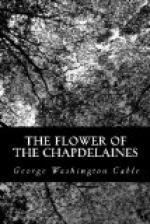“Pra-aise Gawd!” murmured Sidney. “Miss Maud, please hol’ on tell Mingo run’ fetch daddy an’ mammy; dey don’t want dat sto’y f’om me secon’ haynded!” Mingo darted off and we waited. “Miss Maud, what de white folks mean by de nawth stah? Is dey sich a stah as de nawth stah?”
I tried to explain that since all this seeming movement of the stars around us was but our own daily and yearly turning, there would necessarily be two opposite points on our earth which would never move at all, and that any star directly in line with those two points would seem as still as they.
“Like de p’int o’ de spin’le on de spinnin’-wheel, Miss Maud? Oh, yass, I b’lieve I un’stand dat; I un’stan’ it some.”
I showed her the north star, and told her how to find it; and then I took from my watch-guard a tiny compass and let her see how it forever picked out from among all the stars of heaven that one small light, and held quiveringly to it. She hung over it with ecstatic sighs. “Do it see de stah, Miss Maud, like de wise men o’ de Eas’ see de stah o’ Jesus?”
I tried to make plain the law it was obeying.
“And do it p’int dah dess de same in de broad day, an’ all day long?—Pra-aise Gawd! And do it p’int dah in de rain, an’ in de stawmy win’ a-fulfillin’ of his word, when de ain’t a single stah admissible in de ske-eye?—De Lawd’s na-ame be pra-aise’!” Her father, mother, and brother were all looking at it with her, now, and she glanced from one to another with long heavings of rapture.
“Miss Maud,” said Silas, in a subdued voice, “dat little trick mus’ ‘a’ cos’ you a mint o’ money.”
“Silas,” put in Hester, “you know dass not a pullite question!” But she was ravening for its answer, and I said I had bought it for twenty-five cents. They laughed with delight. Yet, when I told Sidney she might have it, her thanks were but two words, which her lips seemed to drop unconsciously while she gazed on the trinket.
They all sat down on the steps nearest below me, and presently, beginning where I had begun with Sidney, I went on to point out the polar constellations and to relate the age-worn story of Cepheus and Cassiopeia, Andromeda and the divine Perseus.
“Lawd, my Lawd !” whispered the mother, “was dey—was dey colo’d?”
I said two of them were king and queen of Ethiopia, and a third was their daughter.
“Chain’ to de rock, an’ yit sa-ave at las’!” exclaimed Sidney.
While her husband and children still gazed at the royal stars, Hester spoke softly to me again. “Miss Maud, dass a tryin’ sawt o’ sto’y to tell to a bunch o’ po’ niggehs; did you dess make dat up—fo’ us?”
“Why, Hester,” I said, “that was an old, old story before this country was ever known to white folks, or black,” and the eyes of all four were on me as the daughter asked: “Ain’t it in de Bi-ible?”
As all but Sidney bade me good night, I heard her say; “I don’ care, I b’lieb dat be’n in de Bible an’ git drap out by mista-ake!”




